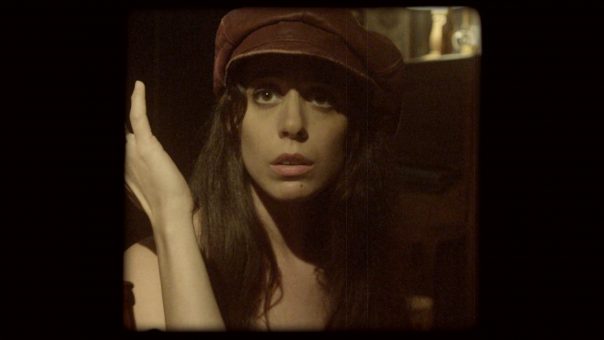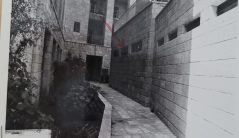The Accursed
Search the Site
Newsletter Signup
Sign up to our newsletter to receive updates about what's going on at the NFCT
The Accursed

A 5-part docu-drama that examines the concept of the total artist. Its protagonists are all iconic figures, “paragons of culture,” whose contribution to the cultural landscape was decisive and unique, and yet they never considered their work as being a separate, distinct part of their lives. These are people who responded to the state of culture at the time with a combination of scorn and rage, and who strove to create an avant-garde alternative. They led wild, scandalous lives, in which conventional boundaries were blurred at best. They gave up on a traditional family life, whether willfully or of necessity, and on property, basic comforts, their health, and even their futures. They strove to achieve great things, and were imbued with a sense of mission and revolutionary zeal. They were megalomaniacal narcissists, destructive to both themselves and their surroundings. They came face to face with madness, with death, and even confronted God Himself (or at least what they thought was God). Yes, their very essence was religious: they held on to an ardent belief tinged with mystical experiences, which actually turned them into gurus of a sort. They transgressed the clear boundaries of morality, and they were expunged for it. Their end was tragic, lonely, and bitter.
Episode 1 – Pinchas Sadeh
In the 1960s and 1970s, the book Life as a Parable had a cult following. Poet Meir Wieseltier said that it had the same “revelatory impact as the launching of the Sputnik into space.” Young people followed Pinchas Sadeh like a prophet, and came knocking on his door in the middle of the night. Hagai, a troubled, self-destructive teen from a religious kibbutz, was one of them. He felt that Sadeh could change his life, and perhaps even save it, so he worked up the courage to meet with him and photographed their encounter on his Super-8 camera. A single knock on the door began a relationship that lasted thirty years, in which Hagai would document Sadeh up until his death. His admiration turned into anger and criticism, though it finally turned into acceptance. Through this relationship he was able to get an intimate look at Sadeh’s total approach to life, at the young women who surrounded him at all times, and at the young people nearest the author, many of whom ended up killing themselves. We come face to face with all the scandals, but also with Sadeh’s books and poems.
Episode 2 – Yona Wallach
In the last two years of her life, the poet Yona Wallach suddenly became a public figure. The scandal caused by her poem “Tefillin” had serious cultural and political implications, her poems set to music became radio hits, and the way she dealt with her cancer was covered intimately by the entire media. Hagai met Yona once as an adolescent and was exposed even then to the cruelty and madness so closely associated with her. He returned to her years afterward to document her as she took account of her life and described the love she felt for the young man living with her. Yona speaks the way she wrote and lived, with boundless intensity, intoxicatedly beautiful language, and rare courage.
Episode 3 – Moshe Kroy
Soon after the Yom Kippur War, a short philosophical tract entitled Life According to the Intellect was published in Israel, and Moshe Kroy, a twenty-five-year-old Doctor of Philosophy became a kind of local guru for one turbulent year. The Theory of Rational Egoism that he developed fell on the eager ears of all the people fed up with all the fallen ideologies. Hagai, who was now about to enter the army, becomes a student of Kroy and documents him too. For years he follows the dramatic turnabouts in Kroy’s philosophy but also in his life. He even follows Kroy to Australia to confront him about what seemed at first to be like a return to religion, or was it to madness?The remarkable story of Moshe Kroy is one of the most extreme examples that this country has known. It is the story of a genius who paid every imaginable price in his uncompromising effort to reach the truth.
Episode 4 – Aviva Uri
The artist Aviva Uri may well have been the most important and influential woman in the history of modern Israeli art. Her relatively late breakthrough in the mid-1970s served to inspire a new generation of artists, who venerated her. It was in these years that Hagai began to document her and her larger-than-life love affair with her elderly husband, the artist Moshe Hendler. Together, they were a tempestuous couple, whose whole life was art. Over the years, however, more and more dark secrets were revealed about Aviva’s life and the price she and those closest to her paid for her total dedication to her art, up until her tragic death.
Episode 5 – Epilogue
In the fifth episode of The Accursed, eighteen-year-old Emanuel Levi, a film student and the son of the series’ creator Hagai Levi investigates the unique format of the series and the motivation behind it. With the help of rare archival footage, he attempts to figure out why his father chose now, of all times, to return to these individuals, and what their message is in the present age. He examines where the need for this unconventional style of documentary came from, with its unusual combination of reenactments and the documentarist’s personal biography. More generally, he investigates what about this series is real and what is fiction.
Director: Hagai Levi
Producer: Liran Atzmor, Hagai Levi
Production Company: Sheleg Productions, Atzmor Productions
Cinematographer: Shark de Mayo
Editor: Tali Helter-Shenkar
Soundtrack Editor: Aviv Aldema
Supporter(s): The New Fund for Cinema and Television, HOT Channel 8
Cast: Neta Spiegelman, Yehuda Almagor, Itay Barnea, Hava Ortman
Script: Hagai Levi, Noam Kaplan, Michal Vinik, Micahl Weiss, Shachar Magen
Subtitles: English
Film Name in Hebrew: המקוללים
A 5-part docu-drama that examines the concept of the total artist. Its protagonists are all iconic figures, “paragons of culture,” whose contribution to the cultural landscape was decisive and unique, and yet they never considered their work as being a separate, distinct part of their lives. These are people who responded to the state of culture at the time with a combination of scorn and rage, and who strove to create an avant-garde alternative. They led wild, scandalous lives, in which conventional boundaries were blurred at best. They gave up on a traditional family life, whether willfully or of necessity, and on property, basic comforts, their health, and even their futures. They strove to achieve great things, and were imbued with a sense of mission and revolutionary zeal. They were megalomaniacal narcissists, destructive to both themselves and their surroundings. They came face to face with madness, with death, and even confronted God Himself (or at least what they thought was God). Yes, their very essence was religious: they held on to an ardent belief tinged with mystical experiences, which actually turned them into gurus of a sort. They transgressed the clear boundaries of morality, and they were expunged for it. Their end was tragic, lonely, and bitter.
Episode 1 – Pinchas Sadeh
In the 1960s and 1970s, the book Life as a Parable had a cult following. Poet Meir Wieseltier said that it had the same “revelatory impact as the launching of the Sputnik into space.” Young people followed Pinchas Sadeh like a prophet, and came knocking on his door in the middle of the night. Hagai, a troubled, self-destructive teen from a religious kibbutz, was one of them. He felt that Sadeh could change his life, and perhaps even save it, so he worked up the courage to meet with him and photographed their encounter on his Super-8 camera. A single knock on the door began a relationship that lasted thirty years, in which Hagai would document Sadeh up until his death. His admiration turned into anger and criticism, though it finally turned into acceptance. Through this relationship he was able to get an intimate look at Sadeh’s total approach to life, at the young women who surrounded him at all times, and at the young people nearest the author, many of whom ended up killing themselves. We come face to face with all the scandals, but also with Sadeh’s books and poems.
Episode 2 – Yona Wallach
In the last two years of her life, the poet Yona Wallach suddenly became a public figure. The scandal caused by her poem “Tefillin” had serious cultural and political implications, her poems set to music became radio hits, and the way she dealt with her cancer was covered intimately by the entire media. Hagai met Yona once as an adolescent and was exposed even then to the cruelty and madness so closely associated with her. He returned to her years afterward to document her as she took account of her life and described the love she felt for the young man living with her. Yona speaks the way she wrote and lived, with boundless intensity, intoxicatedly beautiful language, and rare courage.
Episode 3 – Moshe Kroy
Soon after the Yom Kippur War, a short philosophical tract entitled Life According to the Intellect was published in Israel, and Moshe Kroy, a twenty-five-year-old Doctor of Philosophy became a kind of local guru for one turbulent year. The Theory of Rational Egoism that he developed fell on the eager ears of all the people fed up with all the fallen ideologies. Hagai, who was now about to enter the army, becomes a student of Kroy and documents him too. For years he follows the dramatic turnabouts in Kroy’s philosophy but also in his life. He even follows Kroy to Australia to confront him about what seemed at first to be like a return to religion, or was it to madness?The remarkable story of Moshe Kroy is one of the most extreme examples that this country has known. It is the story of a genius who paid every imaginable price in his uncompromising effort to reach the truth.
Episode 4 – Aviva Uri
The artist Aviva Uri may well have been the most important and influential woman in the history of modern Israeli art. Her relatively late breakthrough in the mid-1970s served to inspire a new generation of artists, who venerated her. It was in these years that Hagai began to document her and her larger-than-life love affair with her elderly husband, the artist Moshe Hendler. Together, they were a tempestuous couple, whose whole life was art. Over the years, however, more and more dark secrets were revealed about Aviva’s life and the price she and those closest to her paid for her total dedication to her art, up until her tragic death.
Episode 5 – Epilogue
In the fifth episode of The Accursed, eighteen-year-old Emanuel Levi, a film student and the son of the series’ creator Hagai Levi investigates the unique format of the series and the motivation behind it. With the help of rare archival footage, he attempts to figure out why his father chose now, of all times, to return to these individuals, and what their message is in the present age. He examines where the need for this unconventional style of documentary came from, with its unusual combination of reenactments and the documentarist’s personal biography. More generally, he investigates what about this series is real and what is fiction.

Director: Hagai Levi
Producer: Liran Atzmor, Hagai Levi
Production Company: Sheleg Productions, Atzmor Productions
Cinematographer: Shark de Mayo
Editor: Tali Helter-Shenkar
Soundtrack Editor: Aviv Aldema
Supporter(s): The New Fund for Cinema and Television, HOT Channel 8
Cast: Neta Spiegelman, Yehuda Almagor, Itay Barnea, Hava Ortman
Script: Hagai Levi, Noam Kaplan, Michal Vinik, Micahl Weiss, Shachar Magen
Subtitles: English
Film Name in Hebrew: המקוללים









 With the support of the Ministry of Culture - The Israel Film Council
With the support of the Ministry of Culture - The Israel Film Council